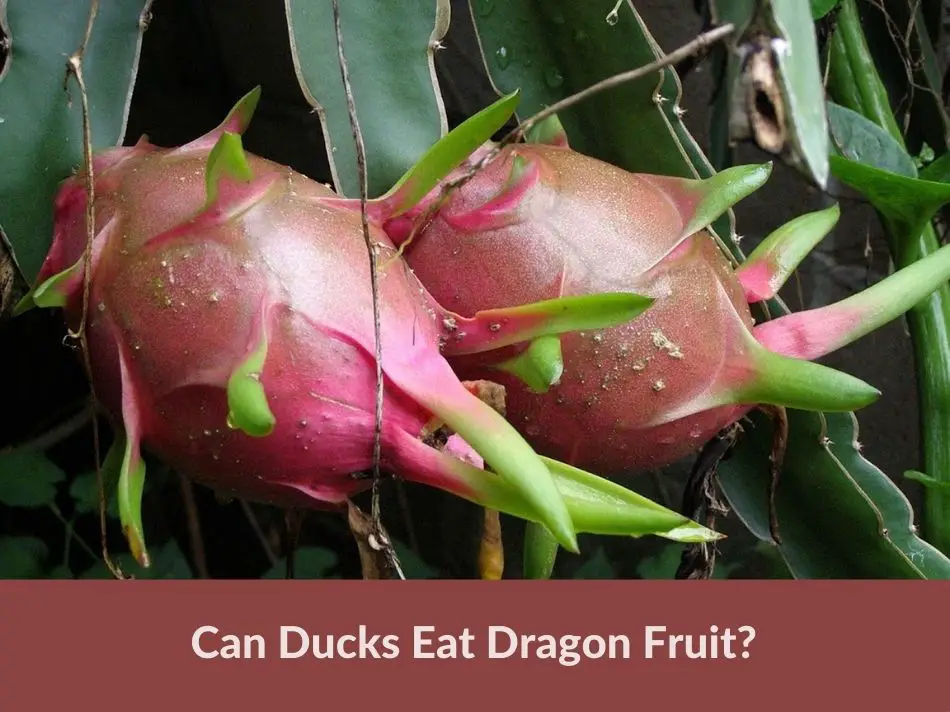Ducks are omnivores, which means they have a varied diet that includes both plant-based and animal-based foods. In the wild, ducks feast on a mix of aquatic vegetation, insects, small fish, worms, and even crustaceans. But, can ducks eat dragon fruit?
Yes, ducks can eat dragon fruit. It’s primarily water, which makes it hydrating, and it also contains essential vitamins and minerals. Given its nutritional content and water-rich nature, dragon fruit can be a safe and enjoyable treat for ducks.
In this article, we’ll delve into the dietary habits of ducks, exploring whether they can consume dragon fruit. We will also touch upon how frequently the fruit can be fed to ducks, if ducklings can enjoy this exotic treat.
How Often Can I Feed My Ducks Dragon Fruit?
While dragon fruit is safe for ducks, it shouldn’t replace their regular diet. Think of it as an occasional treat rather than a staple food. Offering dragon fruit once a week or even less frequently is advisable.
Overfeeding can lead to digestive issues or an imbalance in their nutritional intake. Always prioritize their primary diet of waterfowl pellets or grains and supplement with treats like dragon fruit sparingly.
Can Ducklings Eat Dragon Fruit?
Ducklings are delicate, and their dietary requirements differ from those of mature ducks. While mature ducks can safely consume a variety of foods, including dragon fruit, ducklings should mainly be fed a starter crumb or specific duckling feed designed to provide all the nutrients they need for healthy growth.
If you’re keen on introducing dragon fruit to ducklings, it’s best to wait until they’re a bit older and their digestive systems are more developed. When you do introduce it, do so in tiny amounts, ensuring the pieces are small and manageable.
Is Dragon Fruit Healthy For Ducks?
Dragon fruit, with its unique appearance and texture, is not just an eye-catching treat but is also packed with nutritional elements beneficial to ducks.
Here’s an in-depth look at its nutritional components:
- High Water Content: One of the most significant characteristics of dragon fruit is its high water content, which can be especially beneficial for ducks during hotter months. A hydrated duck is a healthy duck, and providing them with water-rich treats can aid in maintaining their hydration levels.
- Vitamins: Dragon fruit is a good source of several vitamins, notably vitamin C and several B vitamins. Vitamin C plays a vital role in the overall health and immune system of ducks, while B vitamins contribute to energy metabolism and the health of the nervous system.
- Minerals: This tropical fruit offers a variety of essential minerals such as calcium, iron, magnesium, and phosphorus. Calcium, in particular, is crucial for ducks as it helps in the development of strong bones and beaks. It’s also essential for egg-laying ducks, aiding in the production of sturdy eggshells.
- Fiber: The presence of dietary fiber in dragon fruit can aid in digestion for ducks. Fiber helps in the movement of food through the digestive tract, potentially aiding in digestion and preventing constipation.
- Antioxidants: Dragon fruit contains several types of antioxidants, which can help combat oxidative stress in ducks. These antioxidants can support the health and function of a duck’s cells, potentially leading to a longer and healthier life.
- Low Fat and Sugar Content: Dragon fruit is relatively low in fat and sugar, which makes it an excellent treat for ducks. Foods high in fat and sugar can lead to obesity and other health issues in ducks, so incorporating low-fat and low-sugar treats like dragon fruit is a wise choice.
- Seeds: Dragon fruit seeds are small and edible. While they provide some beneficial fatty acids, it might be a good idea to limit or remove them when offering the fruit to ducks. Too many seeds can lead to an imbalance in a duck’s diet.
How To Feed Dragon Fruit To Ducks
- Choose Ripe Dragon Fruit: Begin by selecting a ripe dragon fruit. It should have a vibrant color, be slightly soft to the touch, and free from any blemishes or rotten spots.
- Wash the Fruit: Even though you won’t be feeding the outer skin to the ducks, it’s a good practice to wash the fruit thoroughly to remove any dirt, chemicals, or potential contaminants.
- Cut Into Appropriate Sizes: Using a sharp knife, slice the dragon fruit in half. Scoop out the flesh and dice it into small, bite-sized pieces suitable for the size of the ducks you’re feeding.
- Remove Seeds (Optional): While the seeds in dragon fruit are small and usually safe for ducks, you can opt to remove them if you want to be extra cautious or if feeding to smaller duck breeds.
- Serve in a Shallow Dish: Place the cut dragon fruit pieces in a shallow dish. This allows ducks to easily pick up the fruit pieces without struggling.
- Provide Fresh Water: Always accompany the dragon fruit treat with a fresh source of water. Ducks need water to help them swallow and digest food. Refill their water container if it’s running low.
Other Berries Ducks Can Eat
Ducks, known for their omnivorous nature, have an expansive diet that accommodates a wide variety of foods. Among the vast spectrum of dietary choices, fruits stand out as not only a delicious treat but also as a source of vitamins, minerals, and hydration.
Below are five more fruits ducks loves to eat:
Make sure to see our thorough list of fruits ducks can enjoy.
Conclusion
In summary, dragon fruit presents a myriad of nutritional benefits for ducks, from hydration to vital vitamins and minerals. Offering this fruit as an occasional treat can supplement their regular diet with these benefits.
Always remember to maintain a balanced approach, prioritizing the primary dietary needs of ducks, and introduce any new foods, including dragon fruit, in moderation.
Disclaimer: The information in this article is for informational purposes only. I'm not an expert or a veterinarian.


